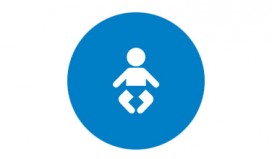Hand in Hand Afghanistan Trustee Kamila Sidiqi on PBS News
Hand in Hand Afghanistan Trustee Kamila Sidiqi – the Deputy Chief of Staff to Afghanistan President Ashraf Ghani – featured on PBS Newshour during a recent trip to the US. Watch the video below.
Edit: Kamila Sidiqi left the Hand in Hand Afghanistan board in December 2015.
Hand in Hand teams up with Safaricom in Kenya
Hand in Hand Eastern Africa is joining forces with Safaricom, Kenya’s leading telecommunications company, to create 7,000 jobs.
Announced on August 12, the Safaricom Foundation’s Key 2 Empowerment fund invites members of Hand in Hand Self-Help Groups to apply for microloans worth up to 30,000 KES (US $290). Only members who have completed their training will be eligible to apply.
“Many young people who wish to start small and medium enterprises lack the capital to do so, and unfortunately, financial institutions classify them as high-risk borrowers,” said Joseph Ogutu, Safaricom Foundation Chairman, during the launch of the fund.
Members of Junior Achievement Kenya, an NGO that provides business and skills training to youth aged 18 to 24, are also eligible to apply.
Safaricom, founded in 1997, is Kenya’s largest mobile network operator. The company is 40 percent owned by the UK’s Vodafone Group Plc.
By the numbers
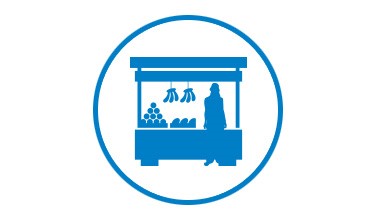 5,000 enterprises
5,000 enterprises
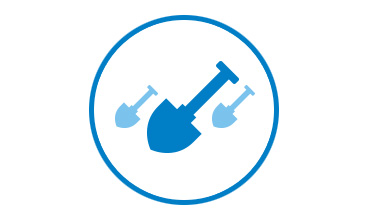 7,000 jobs
7,000 jobs
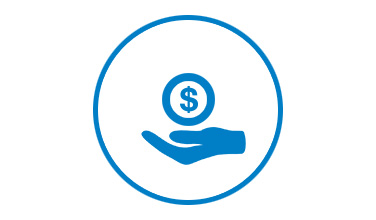 Up to 30,000 KES (US $290) per loan
Up to 30,000 KES (US $290) per loan
In the press
Members of Kenya’s national press were on hand to cover the launch.
The Star – ‘Safaricom launches revolving fund for young entrepreneurs‘
Standard – ‘Safaricom Foundation launches fund for “high-risk entrepreneurs” in Kenya‘
For more information about Hand in Hand Eastern Africa’s partnership with Safaricom, please email Program Manager Agnes Svensson.
Hand in Hand and the Primark Better Lives Foundation eliminate child labour in 99 communities
Hand in Hand and the Primark Better Lives Foundation have teamed up to eliminate child labour in 99 of India’s poorest communities.
Completed in September, the five-year programme opened 170 schools and learning centres, providing more than 7,600 school places, and helped more than 9,200 women launch family-based enterprises, benefitting some 46,000 family members.
“The Primark Better Lives Foundation has been working with Hand in Hand for more than four years now, funding a programme to fight poverty in the state of Tamil Nadu, India,” said foundation trustee Paul Lister. “What we most appreciate about Hand in Hand is their businesslike, entrepreneurial approach to tackling social challenges.”
Stamping out child labour has long motivated Hand in Hand’s work. In fact, our job creation model was developed as a direct response to child labour in India.
“Hand in Hand started as a small NGO struggling to eradicate child labour in Kancheepuram,” explained Hand in Hand Co-Founder Dr Kalpana Sankar. “We followed a child-centric approach, but quickly realized that broader social sensitisation was the key. In October 2004, the organisation shifted its focus to the community.” Put simply, when mothers work, children don’t have to.
Ten years later Hand in Hand has helped create 1.92 million jobs in 10 countries, improving the lives of 9.62 million family members – most of them children. The need for jobs is particularly acute in India, where only 29 percent of women older than 15 have paid work, even while more than 10 percent of children aged 5 to 14 are forced to work at least 14 hours a week.
“Our goal is to create 10 million jobs for some of the world’s poorest residents, helping to fight child labour in the process,” said Hand in Hand International CEO Josefine Lindänge. “Thanks to the Primark Better Lives Foundation’s generous donation, we’re one step closer to getting there.”
Hand in Hand joins forces with Kiva to fight poverty in Kenya
For 10 years and running, Hand in Hand has harnessed the skills of millions of would-be entrepreneurs to fight poverty with jobs. Kiva, established in 2005, have been connecting entrepreneurs with lenders for almost as long. So when Hand in Hand Eastern Africa teamed up with the crowdfunding pioneers to connect rural Kenyans to life-changing microloans, it’s no wonder our entrepreneurs were up to the task.
Mercy, 38, is one of them. Along with the rest of her Ushirika Self-Help Group, the mother of two is seeking US $575 to purchase stock for her growing clothing shop. The group has raised US $100 so far – just a fraction of the US $73,475 our entrepreneurs have raised from 550 lenders since July.
To meet more Hand in Hand entrepreneurs and find how you can lend, visit our page on the Kiva website.
Visit our page on Kiva.org
Rising to the saving challenge
Akiba Nyumbani (‘home savings’) campaign closes in Kenya
For the third year running, Hand in Hand Eastern Africa ran the Akiba Nyumbani (‘home savings’) campaign to raise the awareness of the importance of saving amongst the poorest people in Kenyan society.
In Kenya just 42 percent of the population have a bank account with a formal financial institution (compared to 97 percent in the UK). However, Hand in Hand Eastern Africa is keen to demonstrate that even the most marginalised in society, excluded from formal financial institutions and living on just a few dollars a day can save a little money and that this can be the first step on the ladder out of poverty.
Organised into informal savings groups, all 2014 campaign entrants in Akiba Nyumbani were given a sealed ‘piggy bank’ and encouraged by Hand in Hand Eastern Africa trainers to save regularly. The best savers were rewarded in a high profile awards ceremony in Nairobi in September 2014.
The 2014 Akiba Nyumbani campaign saw entrants save an average KES 4,000 (US $45) in total over six months. This is a significant achievement for people living in communities where the majority (62 percent) support entire families on less than KES 5,000 per month (US $60), 50 percent must walk to the local well or river to get water and 84 percent use fire wood as source of cooking fuel.
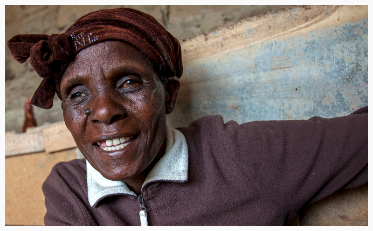
Philomena Nduku Mutuku | Shop Owner | Matuu, Kenya
Last year’s best saver, Philomena Nduku Mutuku was crowned champion yet again this year. The 68 year-old shop-owner, who used to earn just KES 500 (US $6) a week fetching water from the local well for her wealthier neighbors, said: “I did not go to school, but I am a fast learner: thanks to the Hand in Hand training, I can now control what I spend. So, I would estimate what I really needed every week and challenge myself to save the rest”.
Encouraged to save just a little each week, last year Philomena eventually had enough to invest in the necessary stock for a small shop – the only one in a 15km radius from her village. With demand in the shop outstripping her produce supply, this year the indefatigable Philomena hired three staff to work on her farm to increase supply.
As a direct result of saving, Philomena has moved on from carrying water to become an independent businesswoman who today earns some KES 1,000 (US $12) a day.
“Our Akiba Nyumbani campaign demonstrates the power of regular saving to Kenyans living in extreme poverty”
Pauline Ngari, CEO Hand in Hand Eastern Africa
The routine and discipline of regular saving is the first step of the Hand in Hand business creation model. The model was introduced into Kenya in 2010 to empower the country’s most vulnerable and disadvantaged – often women – to work their way out of poverty by running their own businesses.
Hand in Hand India’s Dr Sankar shares financial inclusion expertise

Dr Kalpana Sankar | CEO Hand In Hand India
The CEO of Hand in Hand India, Dr Kalpana Sankar, was invited to speak at the launch of Papua New Guinea’s Centre for Excellence in Financial Inclusion (CEFI) on 24 April. The event was inaugurated by the country’s Prime Minister, Peter O’Neill.
Dr Sankar drew on Hand in Hand India’s ten years’ experience in financial inclusion and microcredit in India and beyond.
In the Hand in Hand model for fighting poverty, entrepreneurial business training dovetails with financial inclusion. Over the past ten years, US $183m of business start-up loans have been extended to some of India’s most disadvantaged rural women, enabling them to set up and expand 915,000 businesses. This approach for job and business creation has now been successfully adapted in six other countries in Asia (Afghanistan) and sub-Saharan Africa (Kenya, Lesotho, South Africa, Swaziland, Zimbabwe).
CEFI is co-financed by the Asian Development Bank (ADB), the Australian Agency for International Development (AusAID) and the Government of of Papua New Guinea and will drive the national strategy for financial inclusion.
Read more about HiH India’s results in financial inclusion and microcredit on the Hand in Hand India website.
Launching Enterprise Incubation Fund
Social impact fund launched to directly benefit 100,000 Kenyan women micro-entrepreneurs
On July 10, business leader turned philanthropist Percy Barnevik launched an impact-first social investment fund from NGO Hand in Hand International at the Partners for Global Impact (PGI)® conference in Lugano.
Percy Barnevik and keynote speaker Sir Ronald Cohen (Chairman of Big Society Capital), together with conference partner INSEAD, challenged the 200 philanthropists, social entrepreneurs and development practitioners at the conference to find innovative solutions to some of the world’s most protracted social problems.
“As a businessman, I recognise good returns when I see them,” Percy Barnevik
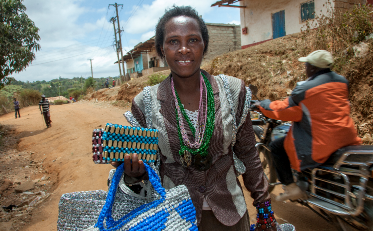
Benedetta Kalondu | Bag maker | Tala, Kenya
Leading by example, Percy Barnevik, founder and chairman of Hand in Hand International, launched the Enterprise Incubation Fund (EIF) for Kenya. The aim of the EIF is to enable Kenyans living at the bottom of the pyramid to access much-needed loans to start their own micro-businesses and work their way out of poverty. The presentation of the fund met with great interest amongst the delegates and there are already discussions underway regarding investments.
Hand in Hand is raising Kenyan Shilling (KES) 250 million (US $ 3m) in loan capital for the EIF. A US $100,000 equivalent investment in the fund supports the creation of 11,500 jobs, helping to lift over 57,000 adults and children out of poverty. The fund pays a fixed 2 percent annual interest in KES over five years.
The fund is targeting micro-entrepreneurs who typically live on less than US $15 a week and often fail to be reached by classic microfinance. Most of these are women. Each loan recipient will be given continuous business mentoring – ranging from financial literacy to basic marketing advice – by Hand in Hand Eastern Africa.

Percy Barnevik | Founder and Chairman of Hand In Hand
Blending microcredit and business mentoring has already proved to be a success outside of Kenya: Hand in Hand has helped to create 976,000 sustainable micro-businesses and more than 1.4 million jobs. The bulk of these results have been achieved by Hand in Hand India which, since 2006, has facilitated access to over US $189 million of credit for micro-entrepreneurs, with loan repayment rates of 99 percent.
Percy Barnevik said: “As a businessman, I recognise good returns when I see them. The EIF looks like one of the best philanthropic buys in international development available today. We only extend loans to those who have developed a viable plan for a micro-business with our support and this ensures very high repayment rates. Philanthropists investing in the EIF can be safe in the knowledge that their money is used productively to create long-lasting businesses and jobs.”
Celebrating entrepreneurial mothers on International Day of the Girl
Hand in Hand Eastern Africa’s CEO Pauline Ngari: Why we must celebrate entrepreneurial mothers on International Day of the Girl
As we support the International Day of the Girl we all know that girls are the future and that the brightness of that future depends on educating girls. But, I speak from personal experience when I say, that in order to educate the girl we must first empower the mother. I was that girl.
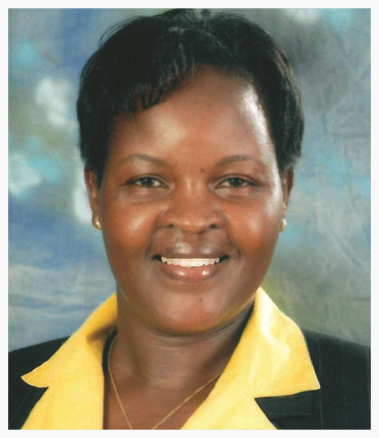
Pauline Ngari | CEO | Hand In Hand Eastern Africa
My story
I was born into a poor farming family in central Kenya. As one of eleven siblings, I helped to manage the family household as my mother tried to make ends meet by running a village shop. The income from that shop made all the difference to our lives and my mother was able to make sure that my siblings and I went to school.
When my mother’s shop failed, life became much harder for us all. And yet that failure is exactly why I set up Hand in Hand’s operations in Kenya in 2010.
My mother had an entrepreneurial spirit but she lacked any form of business training. At Hand in Hand we provide the business training people (predominantly women) need in order to start their own business and increase the family income. Since Hand in Hand first started in India in 2003 we have generated more than 1.4 million jobs and every day we see the transformative effect the resulting increased income has on people’s lives.
If you are poor then education is not your priority
If you are one of the 1.2 billion people who live on just US $1 per day then your priority, every day, is how to find the money to put food on the table and, if you are to survive, every member of the family must work towards that goal.
In such circumstances education is a luxury and figures from the UNESCO Institute for statistics back this up – there is a clear link between household wealth and the probability of not being in school. Compared with children from the richest 20 percent of households, children from the poorest 20 percent are four times more likely to be out of school. Crucially, although girls are always more likely to be out of school than boys, the disparity shrinks with increasing household wealth. Further, we know that women typically invest a higher proportion of their earnings in their families and communities than men (OECD).
The making of entrepreneurial mothers – a success story
This is why Hand in Hand’s business training model is aimed primarily at women. We have developed a system that encourages people to learn the power of group support and a shared goal; that encourages the poor to save just a little each week so they can start their own business or secure a loan; that teaches the poor how to run a small business, not in a classroom with a whiteboard, but with leaders from their own community, through parables, stories and songs.
In just ten years we have provided basic business training to more than a million of the world’s poorest women who have gone on to create some 1 million small businesses.
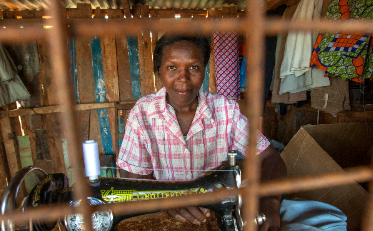
Hannah Haciku | Tailor | Nairobi, Kenya
Hannah Hackiu (pictured left) is one of our many success stories. Born into an impoverished family in central Kenya, her parents could not afford to educate her and so she was married off into another family. Now a mother herself, Hannah’s overriding ambition is to earn enough money to educate her children and ensure theirs is a different future.
With training from Hand in Hand she used her talent for sewing to set herself up in business as a tailor. Within a year, Hannah earned a monthly income of KES 5,000 (US $58) which she invested in changing her family’s life for the better. Now 33, Hannah says she will able to send her 13-year-old daughter to secondary school, giving her the opportunity she did not have herself.
This piece originally appeared on BusinessFightsPoverty
Saving is not a luxury
Hand in Hand Eastern Africa’s CEO, Pauline Ngari: Why saving is the first step on the ladder out of poverty
When World Savings Day was first launched in 1924 the aim was to encourage people to put their savings in a formal bank account rather than ‘under the mattress’ so that they could manage and save their money efficiently.
Today, as we celebrate the 79th World Savings Day, half the world’s population, some 2.5 billion adults, still do not have a bank account. Most of those people live in poor, rural areas in developing countries. For instance, here in my native Kenya, just 42 percent of the population has a bank account – compared to 97 percent in the UK.

Pauline Ngari | CEO | Hand In Hand Eastern Africa
Why should this matter? If you are unbanked, it is that much harder to manage your money and that means you are not saving. In the absence of insurance and formal social safety mechanisms, savings are what see families through economic hardship. As they often cannot access formal credit, savings also provide the poor seed capital to start a business or the finance to expand one.
However, if you are poor, living at the margins of society and excluded from financial institutions, can you really save? Do you have any ‘spare’ money? And if you do, can you save enough to make a difference?
We often assume the answer is ‘No’, but I speak from personal experience when I say that the answer to these questions is emphatically ‘Yes’.
I was born into a poor farming family in central Kenya. After school I helped to manage the family household as my mother tried to run a village shop. When my mother’s shop failed, life became much harder for us all.
However, that failure is exactly why I set up Hand in Hand’s operations in Kenya in 2010. My mother had an entrepreneurial spirit but she lacked any form of business training. At Hand in Hand , we have developed a business creation model to enable people to start and run their own enterprise, increase their income and climb out of poverty.
And we know it works; globally, some 1.5 million people living in poverty in Asia and sub-Saharan Africa have – with our support – saved enough to set up and run over one million businesses.
First we create community groups, mainly women, who support each other, save together and learn together. Members learn to manage money – how to save as well as how to borrow and repay a loan. Here in Kenya – where the national saving rate is only half of the average for all low-income countries – we are running savings campaigns during which our members manage to save an average of 3,500 Kenyan Shillings over six months – a significant achievement when 62 percent of them support entire families on less than KES 5,000 per month (US $60).
Then we train the group members to discover and develop small businesses that make use of their skills and potential.
Next, if needed, we provide access to microloans and finance. Such is the success of our business creation model and the support across the group that 99 percent of these microloans are paid back.
Finally we help turn our members’ ideas into a larger commercial reality, take them to market and achieve sustainable growth, which in turn benefits their families and communities.
Take Philomena Nduku Mutuku, a 67-year-old shop-owner who used to earn just KES 500 (US $6) a week fetching water from the local well for her wealthier neighbours: “I did not go to school, but I am a fast learner: thanks to the Hand in Hand training, I can now control what I spend. So, I would estimate what I really needed every week and challenge myself to save the rest”.
Encouraged to save just a little each week, Philomena eventually had enough to invest in the necessary stock for a small shop – the only one in a 15km radius from her village.
As a direct result of saving, Philomena has moved on from carrying water to become an independent businesswoman who today earns some KES 1,000 (US $12) a day.
And that is the power of saving.
Originally published on Pauline Ngari’s Huffington Post blog
Young Mothers Programme review: ‘Success is almost guaranteed’
Young Mothers Programme Creates ‘Much Better Opportunities’
“Success is almost guaranteed” to women who complete Hand in Hand Eastern Africa’s Young Mothers Programme, according to an independent mid-term review conducted by Brinjal, a UK-based consultancy specialising in livelihoods analysis. The study comes ahead of International Women’s Day on March 8.
“Happiness’ does not simply feel good, but helps (people) function better.” Happiness expert Professor Ed Diener
Launched in Kenya in 2012, the Young Mothers Programme mobilises mothers between the ages of 13 and 30 who, despite lacking skills and training, are major breadwinners in their families. The program combines Hand in Hand’s job creation model with psycho-social support – or, as it’s referred to by participants, “freeing of the mind” – from Clowns without Borders Sweden (CwB), a non-profit organisation that works to “spread laughter, joy and hope” to people affected by conflict and poverty. The project is funded by the Swedish Postcode Lottery.
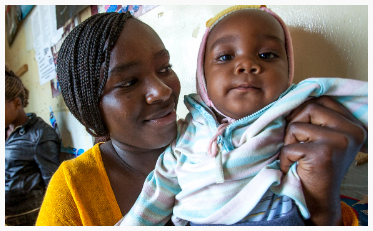
Halima | Young mother and business woman | Kawangware, Kenya
“(Young mothers) understand the benefits of mutual support. They are bright, energetic and dynamic in applying the training provided by the HiH model,” says the review. “When visiting a group that has been operating for 9-12 months it was very clear that most members have established business ventures which mean that they are no longer forced into the casual labour market on a daily basis and have a much better opportunity to plan their livelihoods and look to the future.”
The report also said CwB’s contribution “enhanced the group mobilisation process. Through a series of songs, storytelling and games the group members succeed to shake off the stress of daily life, build solidarity and concentrate fully and equally on the group task at hand.
“In fact,” it continued, “the (Business Relationship Officers) find the techniques so effective that they are being used with (community self-help) groups, not just the Young Mothers Groups.”
No comprehensive research has been done into the benefits of stress-relief in developing world Self-Help Groups, but lots of studies are more broadly applicable. Happiness expert Professor Ed Diene of University of Illinois, for example, “finds that in general ‘happiness’ does not simply feel good, but helps (people) function better.”
The review also identified several areas for improvement. Retaining new members – forced to forego casual labour typically paying 200 Kenyan shillings (US $2.30) a day to attend the group sessions – was chief among them. Planning is underway within HiH Eastern Africa to implement the recommendations.
Young mothers programme by the numbers
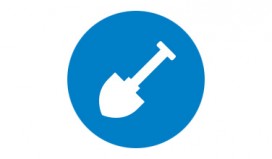
Jobs created: 1,236
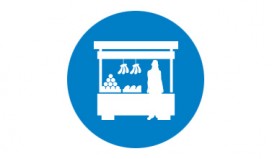
Businesses created: 927
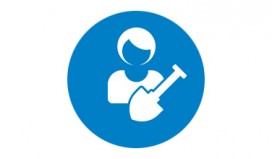
Mothers trained : 1,930
